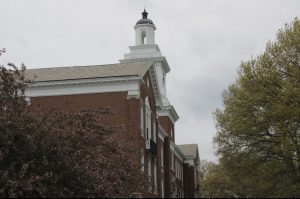Equity Moves From Ideas to Action
Teachers begin the work of detracking and consolidation
September 8, 2021
The Board of Education detracked and consolidated course levels in keeping with the district’s March 2020 adoption of the 2020-25 Strategic Plan.
Detracking aligns with the BOE effort to eliminate systemic racism and inequity within the district. The district has released a series of brief videos, known as the Shaker Rising Video Project, to explain the decision to the community.
Dr. Jeffrianne Wilder, the district’s new Executive Director of diversity, Equity and Inclusion, who heads the video project, defined tracking in the first video as “placing students in tracks, or groups, based upon their perceived ability.”
“Historically and today, underrepresented students of color, typically Black and Hispanic students, have been tracked into the lower-level classes, which negatively impacts their educational outcomes,” Wilder said in the video. At the high school, the tracks have, until this year, comprised core, honors, Advanced Placement and the International Baccalaureate Diploma Program.
Detracking has been supported by the National Education Policy Center, which summarized hundreds of studies of schools that employ tracking and concluded that the practice damages equity more than it benefits learning. For example, one study of Grayton High School found students placed into lower tracks had lower IQ scores in high school. Another study showed classrooms comprising students of mixed abilities performed just as well as, if not better than, tracked classes.
The NAEP review also cited work of social scientist Jeannie Oakes, who found that tracking “can reduce self-esteem, lower aspirations, and foster negative attitudes toward school. Some studies have also concluded that tracking leads low-track students to misbehave and eventually to drop out altogether.”
At the high school Principal Eric Juli said enacting the district’s decision means consolidating classes. “Consolidated courses is taking two courses and making them one,” he said.
For example, Honors Biology and Core Biology have been consolidated as Biology, which is to be taught to all sophomores using the honors curriculum.
Juli said no matter what the goal of tracking is, the practice creates an educational divide. “It’s our belief as a district, that whatever the intentions were to have tracked classes, the result has not been what is best for Black students. It has evolved into the best example of systemic racism in Shaker,” Juli said in a Google Meet interview. “We have to start preparing all of our students for the world they are going to enter. We need to make sure that every student is receiving an honors curriculum.”

Teachers said they were passionate about creating a more successful and inclusive environment through detracked and consolidated courses, but it’s not without challenges, especially in a virtual learning setting.
Kimberly Ponce de Leon, World Language Department chairwoman at the high school, said teachers will always give 100 percent effort toward their students. “As long as supports are given and teacher training is at the forefront, I believe detracking will have huge benefits for our students,” she said.
Sharon Craig, an English teacher who has taught core and honors level sections, said adjusting her teaching for both detracked and virtual learning has been demanding. “I feel like the pandemic has made this change extremely challenging. For some kids I don’t know if what I’m seeing is because they’re at home and they’re distracted, or because it’s too hard,” Craig said.
Her concern is shared by other high school teachers who say they won’t be able to see the immediate effects of consolidating classrooms until school resumes onsite fully.
William Scanlon, a science teacher who has also taught both core and honors level sections, said navigating learning in this virtual setting takes precedence over navigating detracking. “It throws all the questions about whether a kid would normally be able to understand the honors or not because right now all we’re dealing with is how to get students engaged and engaged remotely,” Scanlon said.
Ponce de Leon said teachers were informed of detracking and class consolidation in the late summer months. “We knew probably starting in August,” she said. “That’s when most teachers found out. Teachers typically prepare all through the summer, so we were kind of playing catch up.”
Ponce de Leon teaches AP Spanish V this year and has taught levels of honors and core Spanish throughout her career. She is also a mom of kids who have attended Shaker. Ponce de Leon said, from her experience in both roles, it’s hard for core-level students to have mobility in the tracks once they get to high school because they have not been prepared adequately. “I think the difference [in the tracks] came in the previous preparation. I do highly agree with detracking in the elementary grades because some students come in [to high school] more prepared than others,” Ponce de Leon said.
Jayce Bailey, a high school math teacher, said that teacher collaboration across levels has been key to easing detracking in the math department. The administration has stressed how important sharing ideas, differentiating classwork and methods are to the detracking effort. Bailey added that detracking “hasn’t been too bad” for teachers who previously taught both core and honors sections.
Bailey said the biggest challenge has been finding a way to teach honors-level course work to core-level learners. “We’re trying to push the rigor to honors level, but we’re bringing in the learning strategies that work for core students. You can use some of those strategies to make higher-level work understandable for all students,” Bailey said in a phone interview.
Bailey gave an example of how applying different learning models looks in his math classes. He said assignments from the honors curriculum that are abstract, such as a formulas worksheet, are explained using “real world or tangible” methods, such as a graph. This strategy helps core students learn the rigor of honors work, which tends to be more conceptual, Bailey said.
For example, in the transformations unit of Geometry, Bailey gave students the option of doing their work by naming the formulas and steps or drawing the steps on a graph. Bailey said this made the material “accessible to everyone.”
Wilder said detracking and consolidating courses was going to happen this year regardless of the pandemic. She said detracking is one of the sub points, or smaller agendas, of the two pillars the district’s 2020-25 Strategic Plan rests on: Educational Equity Policy and IB Mission Statement. Wilder said that since the district adopted the plan in March 2020, detracking — one of the first steps in the Education Equity Policy — was to occur this year and that the pandemic did not affect the decision or its timing
Wilder said it is most important to navigate open community conversation about detracking during a pandemic and highlight equity as being the center of everything. “I think that what I do notice is that there is so much relational trust that needs to be built. That is palpable,” Wilder said in a Google Meet interview. “We don’t want folks in the community, especially students, to think that we’re doing this to them and not with them.”
Wilder said that acknowledging the delay in detracking is important to start opening the conversation of trust in the community. “Yes, this is late. Yes, we recognize that we should have been doing this for students who have graduated and are no longer in Shaker,” Wilder said. “I think the district recognizes that Black excellence is vitally important in response to the fact that it has not always been.”
A version of this article appears in print on pages 22-25 of Volume 91, Issue I, published May 28, 2021.
